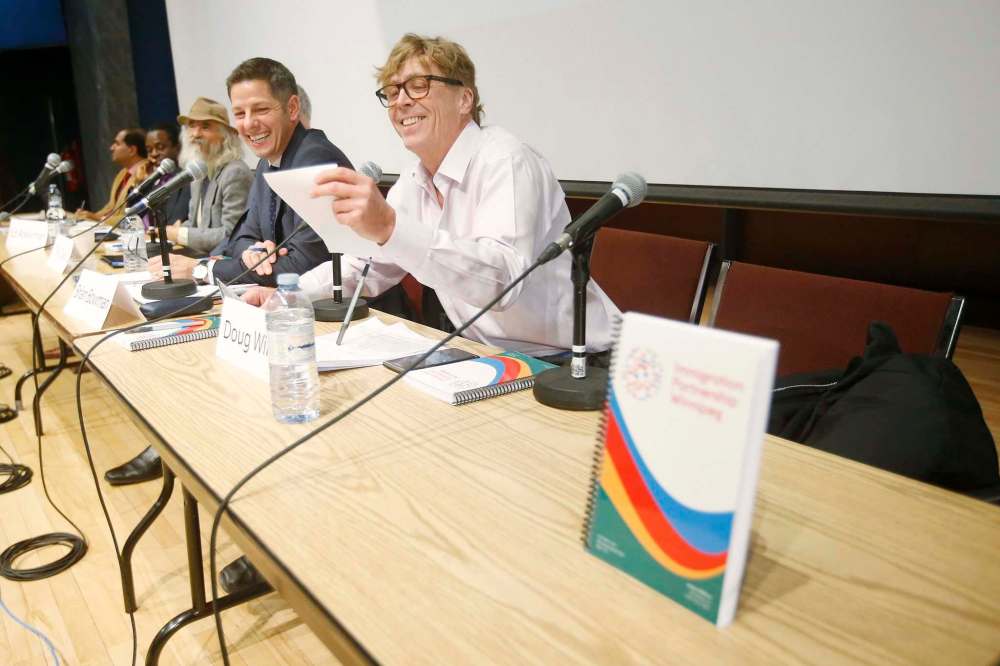Candidates take on poverty
Low-income bus pass, affordable housing among proposals
Advertisement
Read this article for free:
or
Already have an account? Log in here »
To continue reading, please subscribe:
Monthly Digital Subscription
$19 $0 for the first 4 weeks*
- Enjoy unlimited reading on winnipegfreepress.com
- Read the E-Edition, our digital replica newspaper
- Access News Break, our award-winning app
- Play interactive puzzles
*No charge for 4 weeks then billed as $19 every four weeks (new subscribers and qualified returning subscribers only). Cancel anytime.
Read unlimited articles for free today:
or
Already have an account? Log in here »
Hey there, time traveller!
This article was published 16/10/2018 (2010 days ago), so information in it may no longer be current.
Ending poverty in Winnipeg was the focus of a mayoral forum at the University of Winnipeg Wednesday evening.
While city hall provides a broad range of services that affect people’s lives, its ability to effect change — unlike the provincial and federal governments that have a seemingly unending supply of cash for their own priorities — is limited. But the six candidates who participated in the event each offered a variety of solutions to deal with poverty, including the creation of a low-income bus pass, more affordable housing and support to establish a basic income.
“I think the city is doing good things,” said Brian Bowman, the incumbent who wants to keep the job. “I think we could do a better job.”

In addition to Bowman, the participants were Doug Wilson, Umar Hayat, Tim Diack, Ed Ackerman and Don Woodstock. Missing from the event were Venkat Machiraju and Bowman’s chief challenger, Jenny Motkaluk.
There was no explanation given for Machiraju’s absence. Motkaluk had cancelled her agreement to participate because she said it has no value for the voters, describing it as one of many mayoral forums in this campaign that did not allow candidates to question each other.
The forum at the U of W’s Eckhardt-Gramatté Hall was organized by several non-profit community groups: Canadian Centre for Policy Alternatives/Manitoba, Winnipeg Harvest, Social Planning Council of Winnipeg, Make Poverty History Manitoba and West Central Women’s Resource Centre.
The night began with the candidates answering two questions, which they had been given in advance: how would you help people living with a limited budget? And how would you champion a poverty-reduction plan from city hall?
Following a break, the candidates spent the rest of the evening answering questions from audience members.
Bowman spent most of the night referencing what city hall has done in the past four years under his watch, citing its financial support for the United Way’s end homelessness plan, and a recent review of administrative policies on poverty reduction and determining which ones have been successful.
Ackerman, who describes himself as a homeless filmmaker, said he would abolish the business licence fee for small vendors, and shrink the police budget and redirect the funds to help the homeless.
Hayat said he spent the first 24 years of his life in poverty. A real estate and stock market investor, Hayat said he’s convinced poverty can be eliminated in Winnipeg but it’s an objective that must be taken by whoever is mayor.
Hayat said the mayor must encourage businesses to hire more disabled individuals and those with special needs, actively promote small business and attract foreign investments to create jobs. To find the money, he said he would sell off the city’s golf courses and cut the grant city hall gives to the Winnipeg Art Gallery.
“What’s more important, having a golf course or a low-income bus pass?” he said.
Tim Diack, a 31-year Winnipeg police officer, said he’d focus city hall’s efforts on inner-city schools.
“I’ve seen the novelty of good intentions wear off,” Diack, a beat cop in Point Douglas, said, adding the city should provide breakfast, lunch and dinner programs to schools in the poorer neighbourhoods.
“We feed them now or we feed them in prison.”
Wilson, the former mayor of Morden, said he’d put his focus on finding homes for those living on the street.
“When you put people in a stable environment, you can start dealing with the issues,” he said.
Woodstock, a former Winnipeg Transit operator who now owns a commercial and residential alarm company, offered a range of solutions, including ending financial assistance and grants to corporations and using that money for inner-city recreational activities and promoting indoor gardens.
“Whoever wins, hold them accountable,” he said.
aldo.santin@freepress.mb.ca
History
Updated on Thursday, October 18, 2018 7:58 AM CDT: Social Planning Council of Winnipeg


